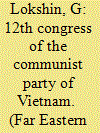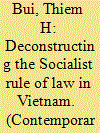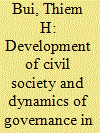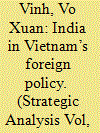|
|
|
Sort Order |
|
|
|
Items / Page
|
|
|
|
|
|
|
| Srl | Item |
| 1 |
ID:
147027


|
|
|
|
|
| Summary/Abstract |
On January 21-28, 2016, the 12th Congress of the ruling Communist Party of the Socialist Republic of Vietnam (CPV) took place in Hanoi. This important event in the public and political life of that country was the topic of a round-table discussion organized by the Center for Vietnam and ASEAN Studies at the Institute for Far Eastern Studies, Russian Academy of Sciences, held on February 25, 2016. About one hundred scholars of Vietnam and experts on Russian foreign policy, scholars from various research centers of Russia, deputies to the State Duma [parliament] of the Russian Federation, officials of the RF Foreign Ministry and other government agencies, representatives of the Eurasian Economic Commission, the Embassy of Vietnam to the RF, and Russia's Trade Mission in Vietnam, public organizations and business circles, Russian and Vietnamese mass media, and students and postgraduates of Moscow higher educational institutions attended the function.
|
|
|
|
|
|
|
|
|
|
|
|
|
|
|
|
| 2 |
ID:
129643


|
|
|
|
|
| Publication |
2014.
|
| Summary/Abstract |
Over the past two decades, efforts by the Communist Party of Vietnam (CPV) to build a "socialist" rule of law through legal and judicial reforms have contributed to the vibrant constitutional politics in the country. During the process of amending the 1992 Constitution, the socialist theoretical foundations of the Constitution quietly shifted as a result of new thinking and values. The complex interactions of old and new ideological precepts were prominently reflected by the changing discourse of human rights during debates about amendments to the 1992 Constitution. This article investigates the development of the "socialist" rule of law and the changes taking place in the discourse of human rights during the constitutional reform process in Vietnam. In setting out the context and content of constitutional reform, it seeks to deconstruct the socialist rule of law and interpret the discourse of human rights accordingly. In doing so, the mechanisms by which human rights have been socialized will be unpacked to make sense of subtle changes in the human rights discourse. Furthermore, the paper aims to uncover the implications of such a change for the development of Vietnam's human rights regime.
|
|
|
|
|
|
|
|
|
|
|
|
|
|
|
|
| 3 |
ID:
118020


|
|
|
|
|
| Publication |
2013.
|
| Summary/Abstract |
Civil society has been in operation under one-party rule in Vietnam in the years since the Doi Moi (renewal) in 1986. Despite the continued monopoly of political power by the Communist Party of Vietnam (CPV), civil society has been gradually expanded and developed. The paper reviews recent arguments in the political science and area studies literature on the emergence of civil society in Vietnam's Doi Moi period over the past two decades, to comment on the dynamics of the relationship between civil society and the party-state, problematizing the development of civil society in the context of a one-party-dominated state. At a certain level, civil society has been 'tolerated', 'endorsed', or recognized by the party state to fill a gap in the governance network. In practice, it has never been an easy project for civil society to make its way into Vietnamese society given the party-state's Gramscian concession to maintain the existing hegemony.
|
|
|
|
|
|
|
|
|
|
|
|
|
|
|
|
| 4 |
ID:
170535


|
|
|
|
|
| Summary/Abstract |
The upgrading of Vietnam–India relations from partnership (2003) to strategic partnership (2007) and a comprehensive strategic partnership (2016) is not merely the result of India’s Look/Act East Policy. It also reflects Vietnam’s high appreciation of the Indian factor in its foreign policy since the Southeast Asian country promoted multilateralism and diversification in its international relations. The article analyses the importance of India in Vietnam’s foreign policy since its reform by examining its relations with India in fields of strategic politics, security, and defence which were guidelined in important political documents of Communist Party of Vietnam (CPV).
|
|
|
|
|
|
|
|
|
|
|
|
|
|
|
|
| 5 |
ID:
113978


|
|
|
|
|
| Publication |
2012.
|
| Summary/Abstract |
This article examines the link between the legitimation process of the Communist Party of Vietnam (CPV) and its adoption of the Doi Moi (renovation) policy. It argues that socio-economic performance emerged as the single most important source of legitimacy for the CPV in the mid-1980s as its traditional sources of legitimacy were exhausted and alternative legitimation modes were largely irrelevant or ineffective. The CPV's switch to performance-based legitimacy has had significant implications for Vietnam's domestic politics as well as its foreign policy and has served as an essential foundation for the Party's continued rule. At the same time, however, it has also presented the CPV with serious challenges in maintaining uninterrupted socio-economic development in the context of the country's growing integration with the global economic system which is experiencing instability. It is in this context that nationalism, couched in terms of Vietnam's territorial and maritime boundary claims in the South China Sea, has been revived as an additional source of legitimacy in times of economic difficulties.
|
|
|
|
|
|
|
|
|
|
|
|
|
|
|
|
| 6 |
ID:
145439


|
|
|
|
|
| Summary/Abstract |
Factional dynamics intensified within the Communist Party of Vietnam during 2015 as it approached its 12th Party Congress, scheduled for early 2016. Economic growth also increased during the year, projected to average 6.5%. Relations with the U.S. warmed steadily, but also thawed slightly with China.
|
|
|
|
|
|
|
|
|
|
|
|
|
|
|
|
|
|
|
|
|